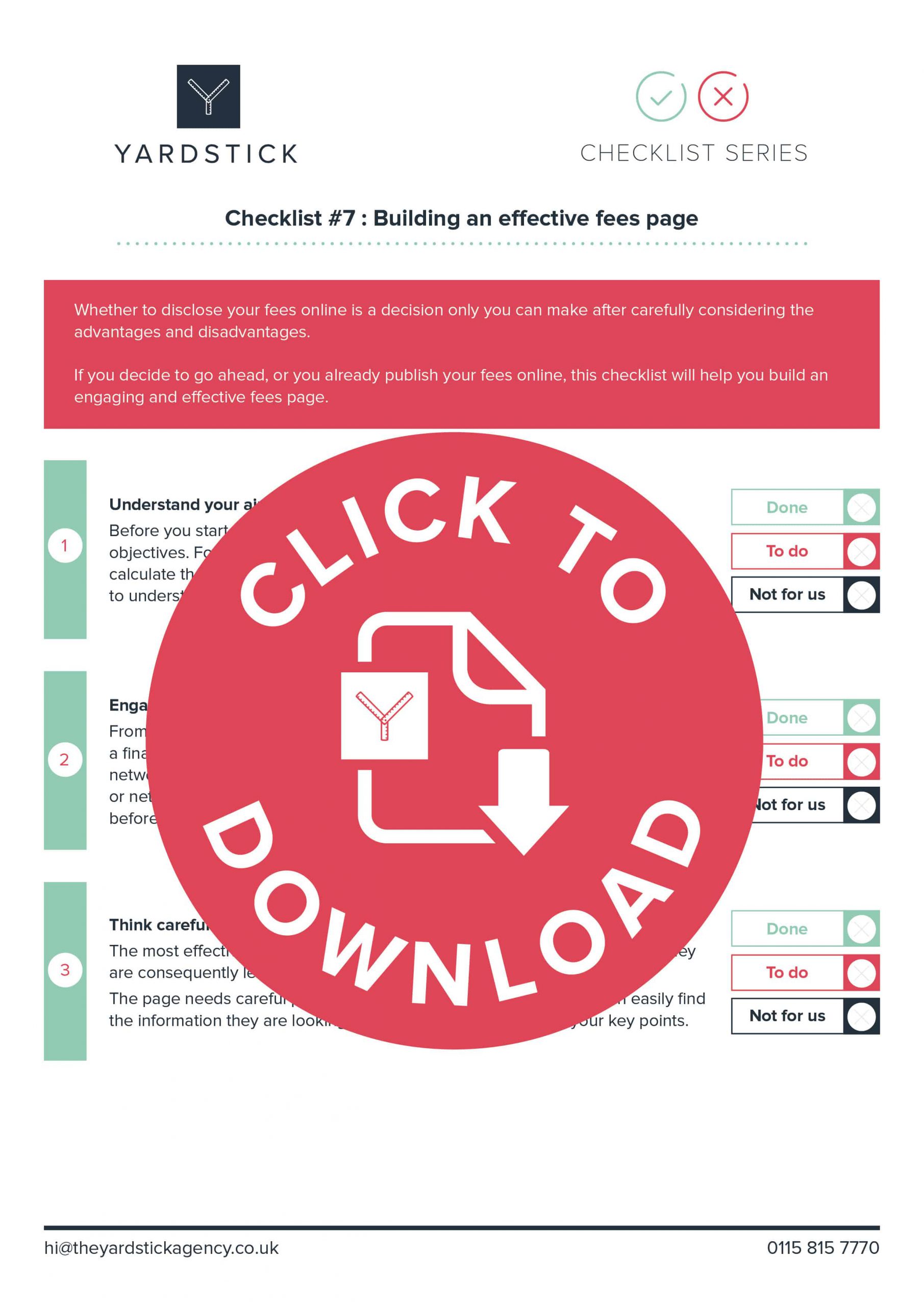Online disclosure of fees is one of those perennial topics which won’t go away.
There’s currently no regulatory requirement for an adviser or planner to publish their fees online. However, there’s certainly pressure from some quarters to change that. Meanwhile, advisers and planners seem split; some vociferously in favour, others more reticent.
Therefore, now seems the perfect time to consider online fee disclosure in more detail. So, this week we’ve tried to put together a complete guide to everything there is to know about the subject. Plus, for those advisers and planners who want to publish their fees online, we’ve put together a free checklist to help you do so as effectively as possible.
A quick word of warning. To be as comprehensive as possible it’s been necessary to write a longer blog than usual; hopefully, you will feel suitably rewarded for investing an extra few minutes of your precious time.
So let’s start with the obvious question…
How many firms already publish their fees online?
We’ve analysed 300 adviser websites, chosen at random, and found that:
- Only 52 (17.33%) mention fees
- Of those, just 15 (5% of all the websites in our research) disclose the likely fees paid by clients
That’s significantly lower than our 2017 Adviser Website Survey, which showed 34.97% of websites included information about fees. There are two possible explanations for the difference. Firstly, firms who previously published their fees online have decided to stop doing so. Secondly, the change in methodology (in 2017 we asked advisers via social media and email to complete the survey, in 2018 we’ve randomly selected websites) has affected the result.
For what it’s worth, we believe the second reason is more likely to account for the difference.
However, what’s very clear is that only a tiny percentage of advisers and planners disclose their fees online.
Why?
The results of our research lead us to ask two key questions:
- Why are some advisers and planners publishing their fees online?
- Why aren’t the other 95%?
Taking each in turn.
After speaking with those firms who publish their fees online, three key reasons for doing so emerged:
- Transparency and trust: Most advisers and planners claim to be transparent and trustworthy (who wouldn’t want to be seen as such?); disclosing fees online demonstrates both. This view is supported by Ray Adams of Niche IFA and AdviserBook: “We receive on average 20 inbound enquiries each week from various sources, the majority are referrals and the rest from local brand awareness and online directories. Every week we are told by several clients they chose Niche as they liked our transparency of fees on our website.”
- Avoiding surprises: If the potential client has already viewed the fees online they will enter the first meeting in a more informed position, which should result in fewer awkward conversations about fees. The slight danger with this, of course, is that there’s no guarantee the prospective client will have viewed the fees page, which may dilute this particular benefit.
- Enquiry selection: Many of those disclosing their fees online did so to deliberately deter enquiries from people who either couldn’t afford their fees or weren’t prepared to pay the amount quoted.
There’s a certain logic to this, especially if the firm is relatively busy and happy to accept that disclosing fees online may reduce the numbers of enquiries received. However, it also means that the adviser or planner won’t get the opportunity to convince the potential client of their value. Unfortunately, understanding whether this is a theoretical or real risk is hard to prove.
Indeed, fear of reducing the number of enquiries received because potential clients see the price before value (although our checklist will help you here) is one of the main reasons given against online fee disclosure. Others suggest it might be hard to give an accurate indication of fees online before they know more about the work they will be required to undertake. There’s another issue too, as Chris Budd points out: “What they come for might not be what they end up leaving with. They initially approach you for investment advice, but leave having handed in their notice and gone travelling for a year!”.
Are consumers interested?
The debate about online fee disclosure is often rather introspective. Both sides concentrate on making the case for their respective position rather than asking whether consumers are actually interested in reading about fees.
To answer that question, we analysed Google Analytics data for the pages where fees were disclosed. What we found (on the face of it at least) seems to indicate that website visitors aren’t interested in information about fees:
- Pages disclosing fees and charges are on average only the ninth most popular page
- Only 1.72% of all website visitors view an adviser’s fees page
However, when we dug deep we found (unsurprisingly) a correlation between the proportion of visitors who look at the fees page and the ease by which it could be found:
- The three websites with the highest proportion of visits to their fees page (14.63%, 5.48% and 4.71% compared to the average of 1.72%) all included a link to it in their main navigation
- In each case, the fees page was the third most popular on the site, significantly higher than the average of ninth
That rather changes the initial findings. It’s clear that a larger proportion of people visit the fees page when it’s easy to find…who knew?!?
Furthermore, we found no evidence to support the fear among some advisers that visitors to websites which included fees were any less engaged with the site.
Our position
It’s not for us to say whether you should disclose your fees online, which is handy, as our position can best be described as being firmly on the fence. We can see merit in both sides of the argument.
From a purely commercial perspective, much depends on your maturity as a business. More established businesses, with a regular flow of referrals and recommendations, can probably afford to take the risk of disclosing fees online; indeed, for them it may be a benefit if it filters out those enquiries that are less serious or unlikely to pay the fees requested. Younger businesses, or those focused on growth, may be less inclined to do so for fear that it will reduce the number of new enquiries they receive.
What we do know for certain is that if you do decide to disclose your fees online you need to do so carefully, ensuring the consumer gets the information they need, while you demonstrate your value and remain compliant.
In fact, let’s start there…
Disclosing fees online compliantly
We’ve already established that there’s no regulatory requirement for advisers and planners to disclose their fees online. As Rory Percival told us: “The FCA does not mandate that advisers show their disclosure on their website. However, this would be considered good practice and aligned with the FCA’s policy objective of ensuring clients receive disclosure at an early stage to allow them to decide whether the services are what they are looking for at a price they are happy with.”
If we cast our minds back to the FCA’s thematic review of July 2013 (thanks to Rory for the heads up on this) the FCA states: “Consumer research suggests that consumers want to receive information on cost and services before a meeting with an adviser. A transparent document that outlines the services available and the related costs helps to build trust in a new advice relationship. Consumers said they would feel more confident and informed if they received the documents in advance.”
This, of course, supports the view of some advisers and planners that they disclose their fees online to demonstrate transparency and trustworthiness.
We asked threesixty for their views about how to disclose fees online compliantly, Jon Roberts (Compliance Policy Consultant) told us: “Disclosure information can be provided to your clients on paper or by using another durable medium such as email or via your website. Bizarrely, there is a regulatory requirement to provide paper copies free of charge, if requested, although these days this should be a rare occurrence.”
“You want your fees to be explicit, free of jargon and placed where the client is most likely to see them in order to encourage them to use you. If you offer several service options set out the fees, then make it clear how these options differ and who they might be suitable for.”
“Do you use hourly rates? If so, take the time to provide a few examples. Are your fees based on percentages? Again, examples are needed to meet the FCA’s ‘clear, fair and not misleading’ rule and also to reduce any ambiguity that might otherwise arise.”
“Your fees need to consistent with any fee disclosure you provide later on in your client engagement process. Make it clear when the fees are due – this helps if the fees are due in stages.”
“Finally, the acid test: ask someone who is not familiar with financial services to read your fee statement over. Have they understood it as you would wish?”
What makes an effective fees page?
We often discuss the importance of advisers and planners proving (perhaps in the form of testimonials, ratings or reviews) that they do an excellent job. It would, therefore, be remiss of us not to do the same before we go any further.
We’ve spent a considerable amount of time thinking about online fee disclosure and how to do it effectively. We are therefore delighted that the three fees pages on which visitors spent most time were all written, designed and developed by us.
Which leads us nicely on to some tips for creating an effective and engaging fees page. To help you do just that, we’ve created a checklist. As usual, it’s free to download and we won’t even ask for your email address.
So, if you already disclose your fees online but feel now is the time to review how you do it, or you feel now is the time to add a fees page to your website, please click here to download the checklist.
Thank you
If you made it to the end, thank you for your patience!
We hope you’ve found the blog and checklist useful. We’d love to get your feedback too, either by leaving a comment below, emailing phil@theyardstickagency.co.uk or by picking up the phone and calling us on 0115 815 7770.
Until next week…


